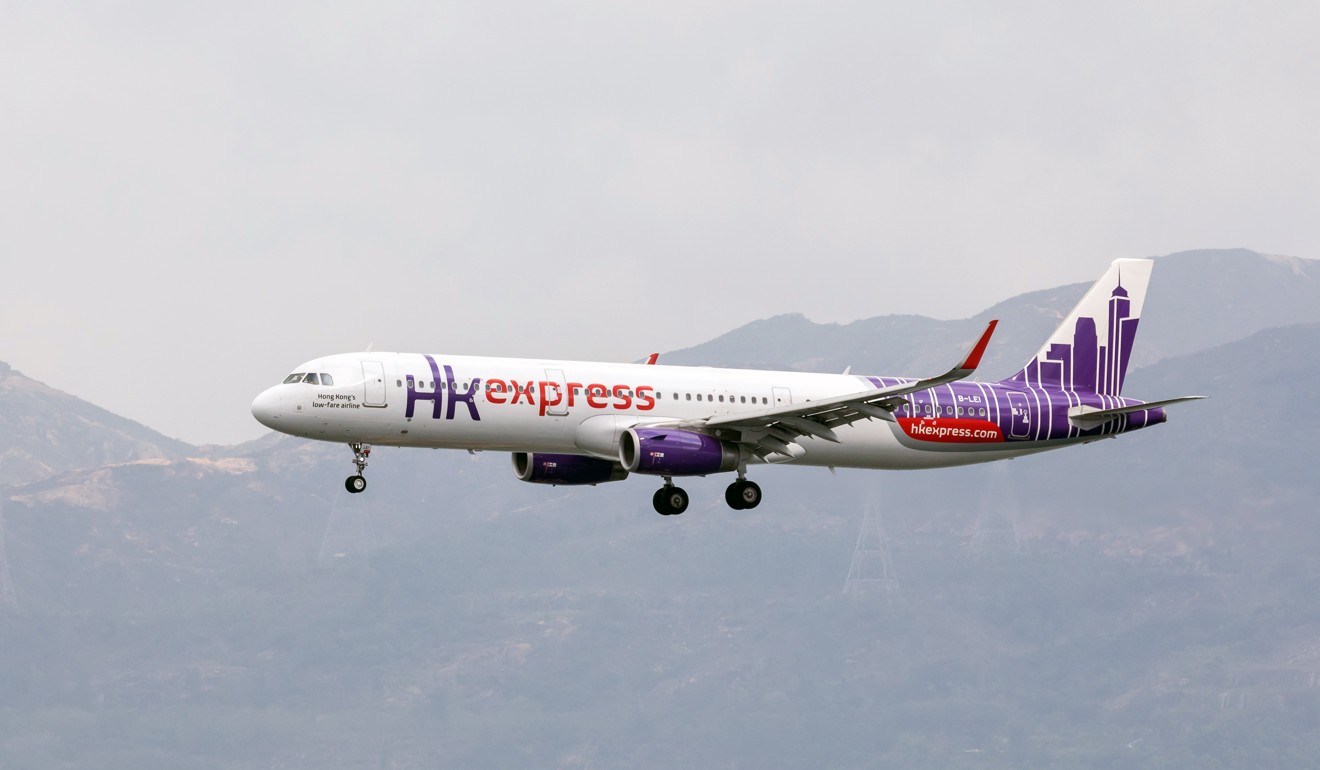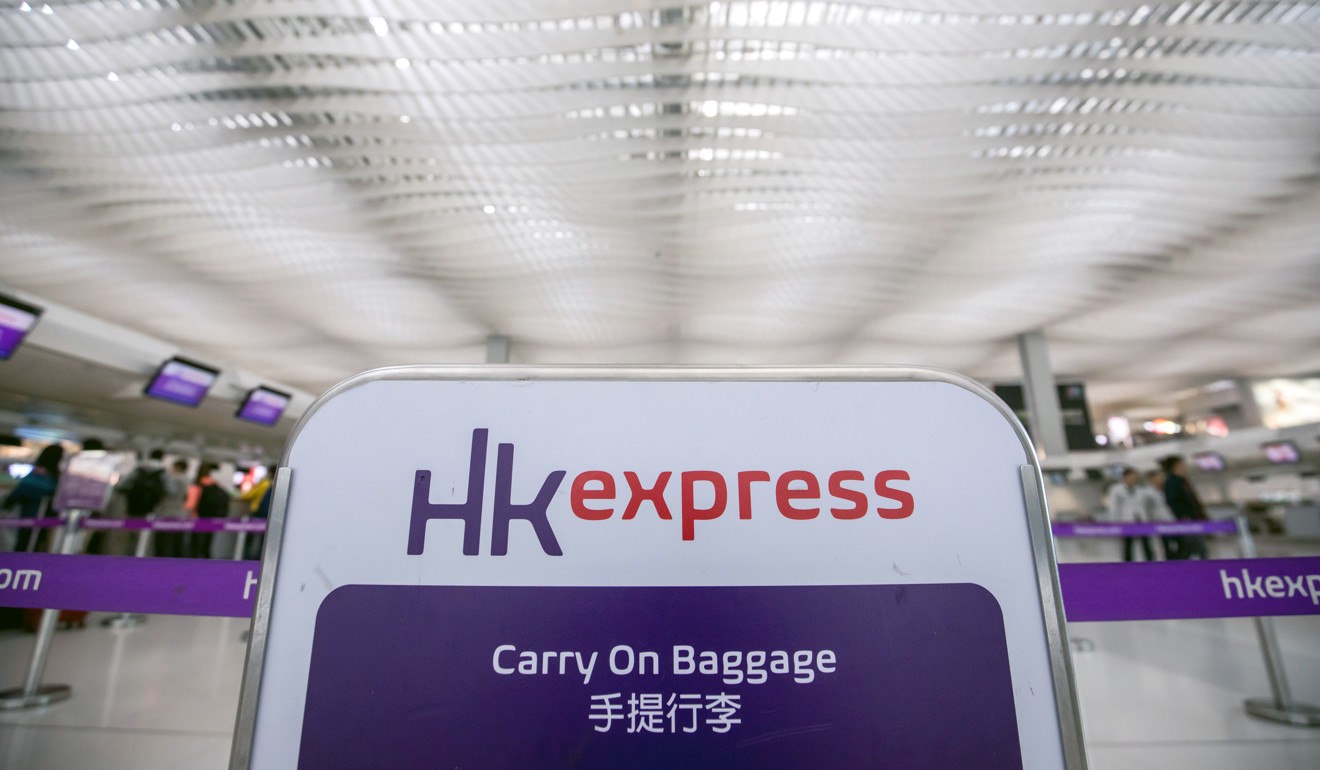
Hong Kong’s Cathay Pacific Airways to pay HK$4.93 billion to buy budget carrier HK Express
- Deal will make company the city’s dominant airline group, in control of three of Hong Kong’s four carriers
- But Cathay faces challenge from HK Express chairman Zhong Guosong, who has resisted selling the stake he controls

A HK$4.93 billion (US$628 million) mega deal announced by Cathay Pacific Airways on Wednesday to acquire low-cost carrier HK Express faces shareholder opposition, with the majority owner signalling he will launch legal action.
Hong Kong’s biggest airline has indicated it faces a challenge from a single player, understood to be HK Express chairman Zhong Guosong, who is resisting selling the stake he controls.
The city’s flagship carrier – which includes its namesake long-haul airline and regional firm Cathay Dragon – will put up HK$2.25 billion in cash and has pledged to repay HK$2.68 billion of debt held by HK Express in the form of promissory notes. The deal will underscore its position as Hong Kong’s dominant airline group.
It has promised not to change HK Express’ low-cost business model, which pulled in 4.1 million passengers last year, and said the budget carrier would continue to operate as a stand-alone airline.

The sale will mean about half of airline seats for sale at Hong Kong International Airport will be offered by Cathay and its enlarged portfolio of carriers, which together will control 45 per cent of the runway slots in the city, according to the CAPA Centre for Aviation.
The deal is unlikely to face major regulatory hurdles, according to analysts.
Cathay CEO Rupert Hogg told staff “a lot needs to be done between now until the completion of the transaction”.
The Post exclusively reported on Monday night that Cathay had successfully concluded talks to buy HK Express.
In a stock exchange filing on Wednesday morning, Cathay said: “Completion is conditional upon certain conditions being fulfilled, including clearances required from relevant competition authorities.”
The transaction is expected to be good for the travelling public, good for the Hong Kong hub and good for the Cathay group
Three of Hong Kong’s four airlines will be controlled by Cathay under the arrangement.
But overcoming opposition from Zhong could prove the biggest obstacle, the airline indicated.
“A firm of solicitors acting for a shareholder of an intermediate holding company of HKE [HK Express] has written to the company indicating an intention to contest the seller’s entry into an agreement for the transaction,” the filing said.
David Yu, a finance professor at New York University Shanghai, said the resistance could indeed impact the acquisition.
“The chairman’s opposition could cause delays or even potentially scuttle the deal if the timeline becomes too lengthened, as well as possibly result in adjustments to some of the terms offered,” he said.
Daniel Wong Kwok-tung, a Hong Kong solicitor, said Zhong would need strong justifications for blocking the deal if the issue went to court. “He would need to show why this is not in the interest of the company,” Wong stressed.

Cathay said the deal would be positive for customers.
“The transaction is expected to be good for the travelling public, good for the Hong Kong hub,” the airline said. “[The] respective businesses and business models are largely complementary.”
It went on to say the deal “represents an attractive and practical way for the Cathay group to support the long-term development and growth of our aviation business and to enhance the competitiveness of the Hong Kong hub during a time of intense regional competition”.
Hong Kong’s Transport and Housing Bureau said it had taken note of the deal and invited Cathay and HK Express to provide information.
“HKE, as a designated airline of Hong Kong, shall ensure their continued compliance with all relevant regulatory requirements after the acquisition comes into effect,” a government spokeswoman said.
The deal is another route for Cathay into the Asia-Pacific region’s booming market for low-cost flights.
Facing competitive pressures from rivals, namely mainland Chinese companies and Middle Eastern airlines, Cathay was late jumping into the sector, executives have acknowledged. The region is expected to see four billion flyers by 2037 – almost half of the worldwide market.
Experts said Hong Kong’s competition watchdog did not have a remit to adjudicate on consolidation in the aviation sector. Its counterparts in Japan and Korea would likely scrutinise but eventually approve the deal.
“This merger will make the Cathay Pacific Group a dominant player in Hong Kong,” said Jae Woon Lee, an expert in aviation and competition law at the Chinese University of Hong Kong. “But they are still competing with foreign airlines in foreign markets ... Cathay won’t be a dominant player in the international market.”
The change of ownership and operator will also require the approval of the city’s air licensing body, the Air Transport Licensing Authority, which would not let the deal through without conditions, according to Dr Law Cheung-kwok, director of policy at the university’s Aviation Policy and Research Centre.
“I think [the authority] may consider or introduce clauses into its approval, such as Cathay keeping HK Express a low-cost carrier for five years at least.”
Law said the government had “good intentions” to establish more local airlines, but had failed. Dragonair was taken over by Cathay in 2006 and became Cathay Dragon, while Oasis Hong Kong collapsed in 2008, and Jetstar Hong Kong was refused permission to fly in 2015. Hong Kong Airlines currently faces an uncertain future as it attempts to restructure to stave off financial difficulties. It is now the only carrier in the city not acquired by Cathay. The fellow HNA-backed airline could benefit from the sale of its sister low-cost unit HK Express by securing funds for the restructuring. It follows previous attempts by HNA at selling a majority stake in the airline to raise the necessary funds to inject into the carrier.
HNA is shedding US$50 billion in assets that were snapped up in a buying binge which has caused financial turmoil at the Chinese conglomerate. The instability has spread to its various businesses, including those in Hong Kong.
Jefferies Financial Group analyst Andrew Lee said: “I think Cathay has looked into [the competition and regulatory hurdles]. For them to announce a deal and 100 per cent ownership, price, etc, they have probably looked into this regulatory issue, in my view.”
A source familiar with the deal said one of the first major tasks for Cathay would be to decide on the top team at the budget carrier, with most executives who came from Hainan Airlines or the corporate parent HNA set to leave.
According to the filing, HK Express recorded HK$141 million in losses last year after achieving a net profit of HK$57 million in 2017.
Cathay Pacific Group generated a profit of HK$2.03 billion in 2018, halting two years of back-to-back losses.
The transaction is expected to be complete on or before December 31, 2019, Cathay said. The budget carrier will become a wholly-owned subsidiary of Cathay.